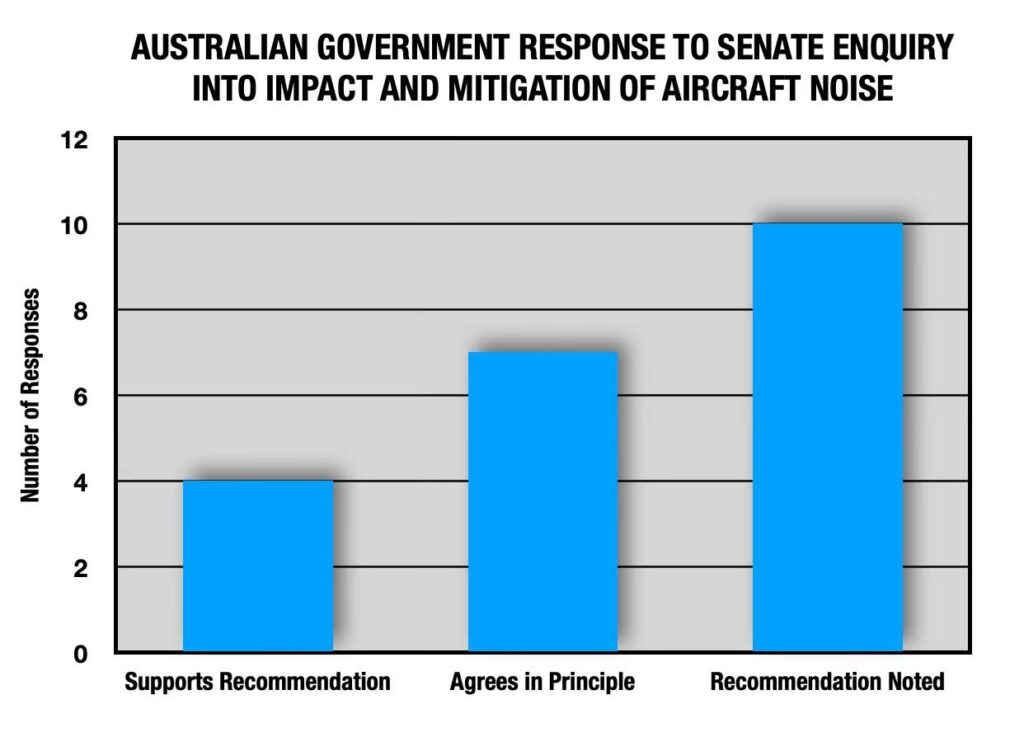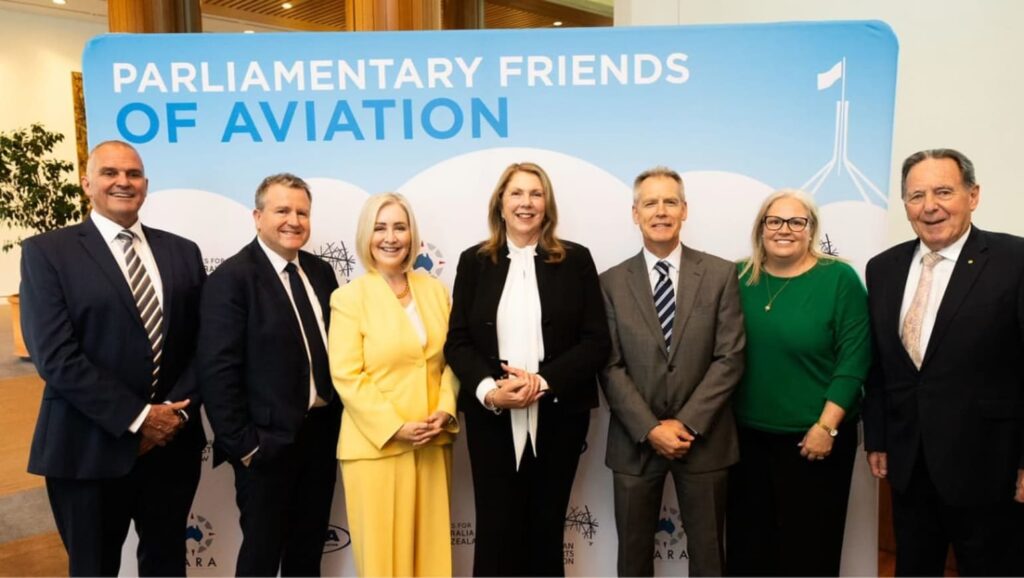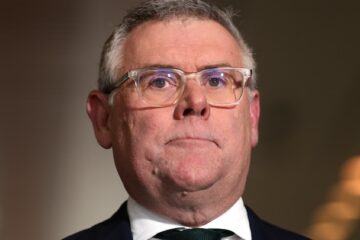BFPCA Media Release, 6 November 2025
- Only 4 of 21 Senate Inquiry recommendations supported in full – the rest merely “noted” or “agreed in principle.”
- No new commitments to curfews, caps, compensation, or independent oversight.
- Reform delayed to 2030 under the Aviation White Paper and future legislative reviews.
- Minister King launched the Parliamentary Friends of Aviation just a week prior to the release of the government’s response
- BFPCA says the response reflects regulatory capture and betrays 700 Australians who made submissions seeking urgent action on aircraft noise pollution.
Brisbane Flight Path Community Alliance (BFPCA) has sharply criticised the Australian Government’s response to the Senate Inquiry into the Impact and Mitigation of Aircraft Noise, released this week.
The Albanese Government has endorsed only four of 21 recommendations in full. Describing it as a calculated evasion of responsibility, BFPCA says the Government’s response to the 2024 Senate Inquiry on aircraft noise took nearly a year to eventuate and fails communities in Brisbane and around the country who are suffering.
The 2024 Senate Inquiry – initiated by the Australian Greens with Coalition and crossbench support – was chaired by Queensland LNP Senator Matt Canavan with astute support from Nationals Senator Bridget McKenzie. It produced a landmark set of 21 recommendations after hearing extensive testimonies from residents, industry stakeholders, and academic experts at hearings held in Brisbane, Sydney, Hobart, and Canberra.
The Inquiry generated historic levels of community engagement, including a record 700 submissions and public attendance at hearings in Brisbane exceeding venue capacity.

“This document is a masterclass in delay and deflection,” said Prof. Marcus Foth, BFPCA spokesperson. “Communities have been waiting and hoping for almost a year for this report that’s nine months late. And now we finally have it and all the government has done is rehearse industry talking points and push any hope of meaningful reform out to 2030.”
The response arrives amid deepening concerns about the government’s proximity to the aviation lobby. On Monday 27 October 2025, Minister Catherine King launched the Parliamentary Friends of Aviation group at Parliament House in Canberra. The group is co-chaired by South Australian Labor MP Clare Clutterham, a Royal Flying Doctor Service board member, and Nationals Senator Bridget McKenzie, who had been a key member of the Senate Inquiry.
BFPCA described the optics of a ceremony celebrating aviation industry ties held days before the release of a government document that dismisses nearly every proposal for community relief from aircraft noise as “deeply troubling.”

“This is not governance; it’s choreography,” said Prof. Foth. “While communities wait for real action to give us quieter skies, the government is busy rolling out the red carpet for the aviation lobby.”
Only three of the Inquiry’s twenty-one recommendations dealt directly with the Brisbane debacle – and even those have been mishandled, watered down, or quietly dismissed.
Recommendation 4 called for Airservices Australia to maximise the use of Simultaneous Opposite Direction Parallel Runway Operations (SODPROPS), enabling over-water flight paths that would spare more than 220 suburbs from incessant aircraft noise. The Government claims to support this recommendation, noting that Minister King issued a Direction in September 2024 requiring Airservices to prioritise SODPROPS during both day and night operations when conditions allow. However, this Direction has already failed to achieve even Airservices’ own meagre 5.3% target.
Recommendation 5 proposed prioritising Continuous Descent Operations (CDO) and Continuous Climb Operations (CCO) – procedures designed to reduce noise and fuel burn. The Government “agreed in principle,” but Senate Estimates evidence confirmed: “Continuous climb operations are not being considered at this stage.” And the so-called “predictable sequencing” trial planned for Brisbane is not genuine CDO. Predictable sequencing merely streamlines aircraft arrival spacing at high altitudes to improve air traffic efficiency; it does not alter low-altitude descent profiles, where noise exposure occurs. In practice, it delivers operational and fuel benefits for airlines, not meaningful noise abatements for communities. True CDO would require a complete redesign of approach procedures to enable continuous low-power descent from cruise to landing – something that BFPCA has been calling for but the Government has not committed to pursuing.
Recommendation 6 urged the Government to amend the Air Navigation (Aircraft Noise) rules for Brisbane so that night operations meet the stricter ICAO Chapter 14 noise standards. The Government “noted” this recommendation – effectively rejecting it – and reiterated its refusal to introduce curfews or movement caps at Brisbane Airport.
Together, these three responses epitomise the Government’s stance: symbolic gestures, bureaucratic hedging, and a steadfast unwillingness to implement enforceable protections for Brisbane residents who have borne the brunt of aviation’s expansion since 2020. For BFPCA, this confirms what residents have long suspected: that Australia’s aviation regulators remain effectively self-policing, with the Department of Infrastructure, Airservices Australia, and airport corporations writing their own rules and marking their own work while sipping taxpayer funded champagne in Canberra.
Quotes Attributable to Prof. Marcus Foth, BFPCA Chairperson
“The Senate Inquiry was a rare moment of political unity. Communities, experts, and senators across the spectrum agreed that reform was overdue. The government’s refusal to act on that consensus is indefensible.”
“Minister King’s decision to launch the Parliamentary Friends of Aviation just days before releasing this response and her ongoing refusal to meet with our community shows exactly where her priorities lie.”
“Australians under flight paths deserve curfews, flight caps, compensation, and accountability – not another round of engagement theatre stretching to 2030.”
“This is state capture in real time. The industry gets a seat at the table; the public gets a pat on the head.”
About BFPCA
With the launch of Brisbane Airport’s New Parallel Runway on 12 July 2020 came a new airspace design and flight paths that concentrate aircraft noise over densely populated residential areas.
Brisbane Airport and Airservices Australia sold this project to Brisbane communities suggesting the New Parallel Runway will enable them to prioritise “over water” operations that direct planes away from residential areas. The CEO Gert-Jan de Graaff is on the record saying, “the net effect of aircraft flying over the city will decrease.”
Brisbane families and communities are suffering from excessive noise pollution and associated health and related impacts from Brisbane Airport’s new flight paths launched in July 2020. The Aircraft Noise Ombudsman report, the Brisbane Airport PIR Advisory Forum (BAPAF) and flight path design consultants TRAX International have all confirmed that Brisbane communities were misled using flawed noise modelling, deceiving community engagement, and offered inadequate noise abatements.
Brisbane Flight Path Community Alliance (BFPCA) came together in 2020 to fight back on behalf of all Brisbane families and communities experiencing this noise pollution.
For more background information, visit: https://bfpca.org.au/


